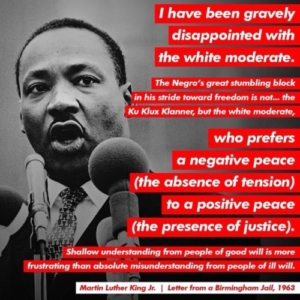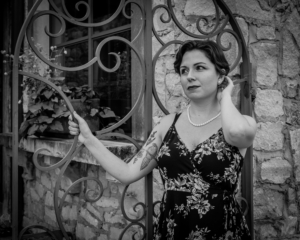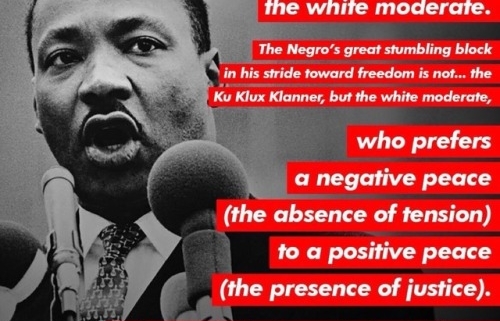Dear White Moderate, Stop Waiting on the World to Change
 Dear White Moderate,
Dear White Moderate,
I grew up well below the poverty line; I was homeless, for a time, in high school; I’m not a Christian; I’m pansexual; I’m a woman; I’m a feminist. These parts of my identity mean that my rights in the U.S. are theoretically in danger. However, I didn’t vote in the 2016 election because it didn’t matter much to me who became president. The laws and enactments brought on by former presidents had almost never affected me personally.
I could still go to college, using grants and high-interest loans, and change my major every semester. I could speed down the highway, buzzing from a few Not Your Father’s Root Beers, with an expired registration sticker without fearing the consequences. I could laugh at memes and Vines, expertly avoiding online conversations about politics and injustice.
Although I was pro-choice, I had never personally needed an abortion. Although I believed in marriage equality, I wasn’t currently dating a woman, so I could hide behind the veil of heteronormativity. Although I believed that people should use whatever restroom they felt comfortable in, I was cisgender and did not have to personally endure transphobia.
And I am white.
I didn’t have to worry about getting deported or arrested or killed for having a skin color that was perceived as threatening.
I made other excuses for not voting too (like that I didn’t like choosing between “the lesser of two evils” and that voting was inconvenient), but ultimately, I didn’t vote because I knew the president’s actions would just be news buzzing around in the background of my life, things I could easily avoid. I could continue to curate my social media in ways that made me feel like a good person, without being one.
On Martin Luther King Day in 2017, one of my good friends posted something on Instagram, a quote from Dr. King I had never seen before:
“I have been gravely disappointed with the white moderate. The negro’s great stumbling block in his stride toward freedom is not the Ku Klux Klan, but the white moderate, who prefers a negative peace (the absence of tension) to a positive peace (the presence of justice).”
I realized with a jolt that this quote was about me. I was the white moderate. I was sitting back and reaping the benefits of white privilege while my friends and their loved ones struggled to keep their rights. Would they have access to healthcare? Would they or their family members be deported or allowed in this country in the first place? Would their children have equal access to education?
For an assignment in my Psychology of Race class in early 2017, I ended an op-ed with these words:
As atonement for not voting in 2016, I not only plan to be more attuned to political news – news from a myriad of sources, ones that challenge my opinions – but I’ll also engage in the hard, political conversations I had been shying away from.
I promise to vote in 2020 for issues that expand beyond myself and encourage others to do that same.
I promise not to turn away from issues that are ugly and hard to take in.
I promise I will no longer be the white moderate.
***
Making this commitment, even in writing, didn’t have the power to change a lifetime of bad habits, it turned out. I have always been the kind of person to cut people out of my life if they breach a boundary. In my family, you only brought up a grievance with someone if you were ready to cut ties, and I trained myself to dismiss other people before they got the chance to abandon me.
I continued to avoid conversations about race. Even after reading all the books from my Psych of Race class, I didn’t feel equipped to change people’s minds about racism, so I opted to give my attention only to people who already agreed with me, like a sunflower turning to face the sunlight.
When avoidance wasn’t possible, I let people in my life who were above a certain age “think the way they were going to think.” I grimaced but ultimately kept my mouth shut when my dad used racial slurs at family gatherings. I blocked people who posted homophobic statuses on social media. I scrolled past any president-related news.
In other words, I let myself become even more siloed than I had been during the 2016 presidential election.
Since my commitment to vote in 2020, I have knowingly accepted more money than my Black coworkers for performing the same duties. I have shaken my head at this injustice and done nothing to fix it. I have wondered, “What can I do?” but not for too long. Because in asking the question, I was ultimately telling myself, “There’s nothing I can do.” I was soothing myself and saying, “I don’t need to do anything.”
I thought that voting was the only way I could actively fight inequality, and to me, the elections that really mattered only came every four years. What could I do between elections? I was just one person, not very well-versed in political or government matters.
I knew that people went to protests, but they didn’t make sense to me: How did holding a sign ever change a policy for the better? Publicity goes a long way, but it seemed to me that many people, mostly white, went to protests to ask someone to snap a picture of them holding their cleverly phrased signs on Walmart posters, so they could post them on social media and be labeled as “Not the Bad Kind of White Person” by their white peers.
I had no idea how petitions worked.
I was skeptical about donating to nonprofit organizations after learning that national programs use donations to pad the pockets of executive team members.
I had always scoffed at those John Mayer lyrics — “It’s not that we don’t care; we just know that the fight ain’t fair, so we keep on waiting, waiting, waiting on the world to change” — but it was starting to seem like he had been right. It seemed like we were powerless to make real change. Even those of us with privilege.
***
It wasn’t until the death of George Floyd in May 2020 that I started to seriously ask how I could be a better ally. It wasn’t until a few months ago that I first heard the phrase “anti-racism.” I really thought it was enough to just be “not racist” and to listen with compassion and understanding when my friends of color voiced their upset about systemic prejudice.
But after George Floyd was murdered on camera by a police officer, I couldn’t feign surprise anymore. I couldn’t ask, “How could this happen?” It had been happening, but I stopped noticing because I had become desensitized to abuse against Black bodies.
Because of my poor allyship to the Black community, I had been, in large part, letting it happen.
As much as I had rolled my eyes at seemingly performative protests, petitions and fundraisers, I was starting to see that they could actually make change. I was seeing that these “unprecedented times” we’ve been living in for the past several months could be a window into a vastly different — and better — future. Thanks to Twitter threads with petition links and Instagram stories encouraging donations to nonprofits with local missions, I have been able to be a better ally.
I still need to work on having enough compassion for others to stay with them and have hard conversations about racism and other forms of prejudice. I still need to educate myself about systemic racism, learning enough about our complicated government to navigate it and enact change to the best of my personal ability. I have a long way to go. But I’m learning that my commitment to anti-racism and to ending my own white moderacy means accepting that I have so much more to learn. It means being open to learning more and admitting when I’m wrong.
It means working to gradually overcome my fear of tension — because I know that the only reason I have the option to escape these hard conversations is because I am white.
***
 Amanda Woodard is an MFA candidate at Antioch University and a freelance copywriter at mediamanda.com. Her work has been performed in Oral Fixation and published in Ten Spurs, eris & eros and FlashFlood. When she’s not reading and writing, she enjoys playing board games, rock climbing and practicing yoga.
Amanda Woodard is an MFA candidate at Antioch University and a freelance copywriter at mediamanda.com. Her work has been performed in Oral Fixation and published in Ten Spurs, eris & eros and FlashFlood. When she’s not reading and writing, she enjoys playing board games, rock climbing and practicing yoga.





